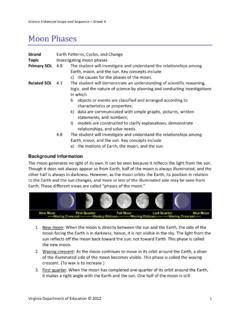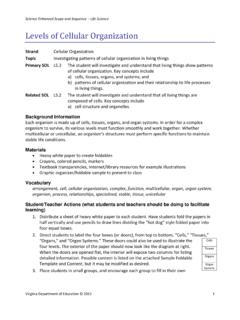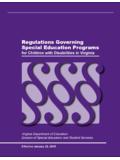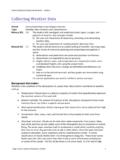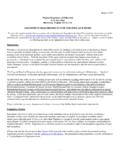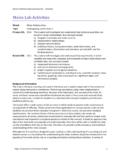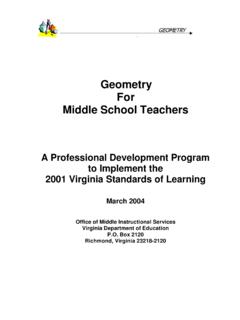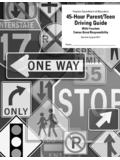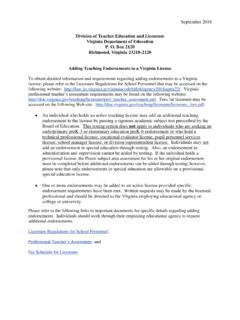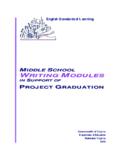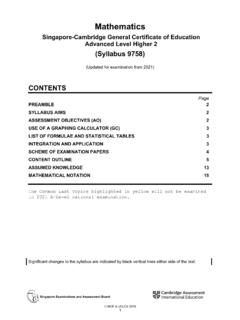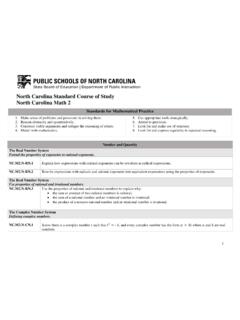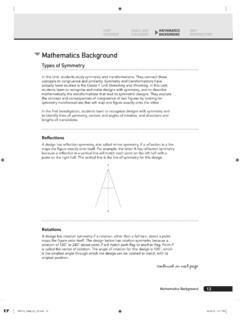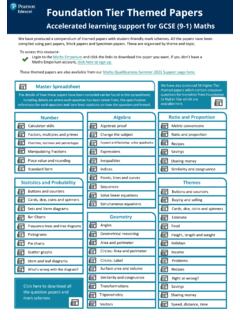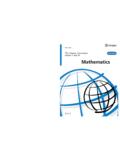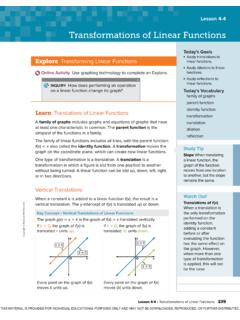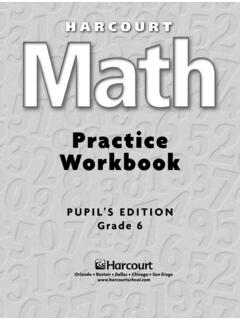Transcription of Logic and Conditional Statements
1 Mathematics Enhanced Scope and Sequen ce Geo metry Vi rgi nia Department of Educati on 2011 1 Logic and Conditional Statements Reporting Category reasoning , Lines, and transformations Topic Investigating symbolic form while worki ng with Conditional Statements Primary SOL The student will construct and judge the validity of a logical argument consisting of a set of premises and a conclusion. This will include a) identifying the converse, inverse, and contrapositive of a Conditional statement; b) translating a short verbal argument into symbolic form; c) using Venn diagrams to represent set relationships; and d) using deductive reasoning . Related SOL , Materials Activity Sheets 1, 2, and 3 (attached) Flash cards (attached) Logic and Conditional Statements handout (attached) Vocabulary intersection, union, Venn diagram (earlier grades) Conditional statement, hypothesis, conclusion, negation, negate, converse, inverse, contrapositive, biconditional, Law of the Contrapositive, Law of Detachment, Law of Syllogism, valid argument, logical argument, conjecture, verify, proof, prove, disprove, counterexample, undefined term, postulate, theorem ( ) Student/Teacher Actions (what students and teachers should be doing to facilitate learning) 1.
2 Distribute copies of Activity Sheet 1, and review the basic vocabulary included. 2. Distribute copies of Activity Sheet 2, and work through the examples with students. 3. Distribute copies of Activity Sheet 3, and have students work in pairs or small groups to complete the problems. 4. Have students discuss findings with their partners. 5. Discuss findings as a whole group. Distribute copies of the attached Logic and Conditional Statements handout, and review it with students. Have students use it for quick reference. 6. Use flash cards as a quick review and a check for understanding. Assessment Questions o What is the inverse of the converse of p q? Use symbols p, q, , and ~ and math vocabulary to answer this question. o What conclusion can you draw, using all of the following Statements ? ~q s t ~r q t u ~s Mathematics Enhanced Scope and Sequen ce Geo metry Vi rgi nia Department of Educati on 2011 2 Journal/Writing Prompts o Draw a Venn diagram to represent the two Statements , No reptiles have fur and All snakes are reptiles.
3 Then, draw a logical conclusion, if possible. o Write a converse-inverse-contrapositive poem by writing an , then statement followed by its converse, inverse, and contrapositive. Create additional stanzas using related , then Statements . o Read one of Laura Numeroff s books, such as If You Give a Mouse a Cookie, to the class. Discuss it as an extended syllogism or logical chain, and have students write a story that is a logical chain of syllogisms. Other o Have students work in pairs to evaluate strategies. o Use activity sheets to help assess student understanding. Extensions and Connections (for all students) Have students investigate Lewis Carroll s Logic puzzles. Have students solve the Logic puzzle from J. K. Rowling s Harry Potter and the Sorcerer s Stone, 1998, p. 285. Invite a politician or political analyst to visit the class.
4 Ask the guest speaker to explain the relationships among facts, trends, and educated guesses. Strategies for Differentiation Have advanced students explore truth tables. Have students write their own Conditional statement in , then form. Take four slips of paper. Write If on one slip, then on another, the hypothesis on the third, and the conclusion on the fourth. Flip the hypothesis (top to bottom), and write the negation of the hypothesis on the back. Do the same for the conclusion. Use these slips to illustrate converse, inverse, and contrapositive. This can also be done in a larger format with students holding the slips in front of the class. When introducing symbols, label the hypothesis, conclusion, and negation Statements with p, ~p, q, and ~q. Use three slips of paper, as above, labeled with p, , and q to illustrate converse, inverse, and contrapositive using symbols.
5 (Write ~p on the back of p and ~q on the back of q, flipping from top to bottom.) Have students write an , then statement of their choosing on an index card. Write the converse, inverse, and contrapositive on the back of the card. Check that they are correct. During the next class, use cards to quiz each other in pairs, and then trade with another pair of students. Mathematics Enhanced Scope and Sequen ce Geo metry Vi rgi nia Department of Educati on 2011 3 Activity Sheet 1: Vocabulary and Symbols Name Date Define each of the following vocabulary terms. Term Definition Conditional Statement S_____ that can be w_____ in , then form Hypothesis Part of a c_____ statement that f_____ if Conclusion Part of a Conditional s_____ that follows then Negation D_____ of a s_____ formed by adding or removing the word _____ from a statement Negate To add or remove the word _____ from a statement to change its truth value from true to _____ or from false to _____ Converse S_____ formed f rom a c_____ statement by s_____ the h_____ and c_____ Inverse S_____ formed from a c_____ statement by n_____ the h_____ and c_____ Contrapositive S_____ formed from a c_____ statement by s_____ AND n_____ the h_____ and c_____ Biconditional Statement combining a c_____ statement and its c_____, using the phrase if and o_____ if Fill in the meaning of each of the following symbols.
6 P, q, r, s, t, etc. Meaning: Meaning: Meaning: Meaning: Meaning: Meaning: Meaning: Mathematics Enhanced Scope and Sequen ce Geo metry Vi rgi nia Department of Educati on 2011 4 Activity Sheet 1: Vocabulary and Symbols Instructor s Reference Define each of the following vocabulary terms. Term Definition Conditional Statement Statement that can be written in , then form Hypothesis Part of a Conditional statement that follows if Conclusion Part of a Conditional statement that follows then Negation Denial of a statement formed by adding or removing the word not from a statement Negate To add or remove the word not from a statement to change its truth value from true to false or from false to true Converse Statement formed from a Conditional statement by switching the hypothesis and conclusion Inverse Statement formed from a Conditional statement by negating the hypothesis and conclusion Contrapositive Statement formed from a Conditional statement by switching AND negating the hypothesis and conclusion Biconditional Statement combining a Conditional statement and its converse.
7 Using the phrase if and only if Fill in the meaning of each of the following symbols. p, q, r, s, t, etc. Meaning: Symbols used to represent Statements such as hypotheses and conclusions Meaning: , then (implies) Meaning: or Meaning: not Meaning: therefore Meaning: and Meaning: if and only if (iff) Mathematics Enhanced Scope and Sequen ce Geo metry Vi rgi nia Department of Educati on 2011 5 Activity Sheet 2: Logic and Conditional Statements Name Date Use the following Conditional statement to answer the problems: If I win, then you don t lose. 1. Write the hypothesis. 2. Write the conclusion. 3. Negate the hypothesis. 4. Negate the conclusion. 5. Write the converse. 6. Write the inverse. 7. Write the contrapositive. 8. Write the biconditional. Use the following Conditional statement to answer the problems: If elephants fly, then fish don t swim.
8 Each answer should be a complete sentence, not symbols. 1. p is the hypothesis. Write p. 2. q is the conclusion. Write q. 3. p means the negation of p. Write p. 4. q means the negation of q. Write q. 5. (converse) q p means q implies p or If q, then p. Write q p. 6. (inverse) p q means Not p implies not q or If not p, then not q. Write p q. 7. (contrapositive) q p means Not q implies not p or If not q, then not p. Write q p. 8. p q means p and q. Write p q. 9. p q means p or q. Write p q. 10. p means theref ore p. Write p. 11. p q means p if and only if q. Write p q. Mathematics Enhanced Scope and Sequen ce Geo metry Vi rgi nia Department of Educati on 2011 6 Activity Sheet 3: Logic and Conditional Statements Name Date 1. Write each of the following Statements as a Conditional statement.
9 Then, circle the hypothesis, and underline the conclusion. a. Mark Twain wrote, If you tell the truth, you don t have to remember anything. b. Helen Keller wrote, One can never consent to creep when one feels the impulse to soar. c. Mahatma Ghandi wrote, Freedom is not worth having if it does not include the freedom to make mistakes. d. Benjamin Franklin wrote, Early to bed and early to rise makes a man healthy, wealthy, and wise. 2. Write the converse, inverse, and contrapositive for each of the following Conditional Statements . Determine whether each is true or false. a. If I win, then you don t lose. Converse: Inverse: Contrapositive: True or false: b. If two segments are congruent, then they have the same length. Converse: Inverse: Contrapositive: True or false: 3. Use the Law of Detachment to reach a logical conclusion about the following statement: If it is raining, then Sam and Sarah will not go to the football game.
10 This is a true Conditional , and it is raining. Mathematics Enhanced Scope and Sequen ce Geo metry Vi rgi nia Department of Educati on 2011 7 4. Statement 1: If two adjacent angles form a linear pair, then the sum of the measures of the angles is 180 . Statement 2: If the sum of the measures of two angles is 180 , then the angles are supplementary. By the Law of Syllogism, which statement below follows from Statements 1 and 2? a. If the sum of the measures of two angles is 180 , then the angles form a linear pair. b. If two adjacent angles form a linear pair, then the sum of the measures of the angles is 180 . c. If two adjacent angles form a linear pair, then the angles are supplementary. d. If two angles are supplementary, then the sum of the measures of the angles is 180 . 5. Let p: you see lightning and q: you hear thunder.
